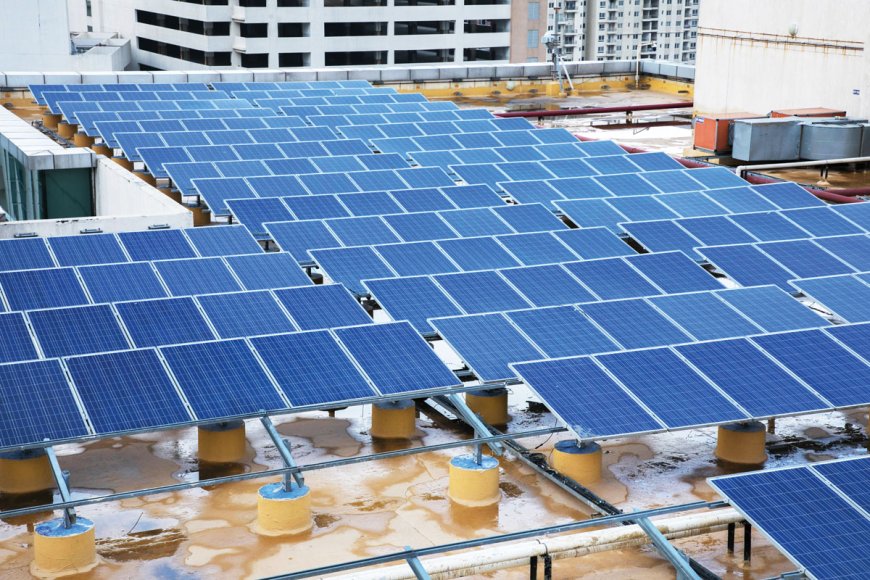Alternative energies to promote SUSTAINABLE real estate

There is an increasing need to address climate change, which requires the real estate sector to align their operations using alternative energies to promote sustainability. Traditional energy sources, such as coal, oil, and natural gas, are not only finite but also major contributors to greenhouse gas emissions. In contrast, alternative energy sources offer a cleaner, more sustainable way to power our buildings and communities.
As technology advances and costs continue to decrease, the integration of renewable energy sources has become more accessible. Moreover, regulatory frameworks and corporate sustainability commitments are increasingly prioritizing green building practices, further driving the shift towards sustainable real estate.
Solar energy
Solar energy is one of the most widely adopted forms of alternative energy in real estate. Solar panels can be installed on rooftops, facades, and even as part of building materials like solar shingles. Photovoltaic (PV) systems convert sunlight directly into electricity, providing a renewable source of energy that reduces reliance on fossil fuels. Solar energy can significantly reduce electricity bills for property owners and tenants by generating power on-site, leading to substantial cost savings. Additionally, buildings equipped with solar panels can achieve greater energy independence, reducing their reliance on the grid and increasing resilience against power outages. Importantly, solar energy production emits no greenhouse gases, making it an environmentally friendly choice that helps combat climate change.
Despite its advantages, solar energy does present some challenges. The initial costs of installing solar panels can be high, though these costs have been decreasing over time.
Wind energy
Wind energy, harnessed through wind turbines, is another promising alternative energy source. While traditionally associated with large wind farms, advances in technology have made it possible to integrate smaller wind turbines into urban environments and residential areas.
Wind energy is highly scalable, with turbines that can be tailored to meet the energy needs of various properties, from single-family homes to large commercial buildings. Wind farms can be constructed on existing agricultural land, allowing for dual land use without significant disruption. Once installed, wind turbines incur low operational and maintenance costs, making them an economical long-term energy solution. However, wind energy generation is heavily dependent on location, requiring areas with consistent wind patterns, which limits its applicability in certain regions.
The role of property management companies as renewable energy consultants
Property management companies play a crucial role in promoting the adoption of alternative energies within the real estate sector. As renewable energy advisors, they can guide property owners, developers, and tenants through the complex landscape of renewable energy options and help implement sustainable practices. Here’s how property management companies can make a significant impact:
Renewable energy consultancy
Asset management: Property management companies can oversee the performance of renewable energy systems, ensuring they operate efficiently and deliver maximum returns on investment.
Installation: From planning to execution, property management companies can manage the installation process of renewable energy systems, ensuring compliance with industry standards and regulations.
Operation and Maintenance (O&M): Regular maintenance is essential for the longevity and efficiency of renewable energy installations. Property management companies can provide ongoing O&M services to keep systems running smoothly.
Demand assessment: Conducting detailed energy demand assessments helps identify the specific energy needs of a property, enabling the selection of the most appropriate renewable energy solutions.
Wheeling and banking: Property management companies can navigate the complexities of wheeling and banking, where energy produced in one location can be transmitted and utilized in another, optimizing energy use and cost savings.
Liaising: Effective communication with stakeholders, including utility companies, regulatory bodies, and contractors, is crucial. Property management companies can act as liaisons, facilitating smooth project execution.
Regulations: Staying updated with the latest regulations and compliance requirements is vital. Property management companies can ensure that all renewable energy projects adhere to local, state, and federal regulations.
Rooftop solar: Installing rooftop solar panels is a popular and effective way to harness solar energy. Property management companies can assess the feasibility, design the system, and oversee the installation of rooftop solar arrays.
EV charging: As electric vehicles (EVs) become more prevalent, the demand for EV charging stations is increasing. Property management companies can integrate EV charging infrastructure into real estate projects, providing a valuable amenity for tenants and visitors.
Integrating alternative energies into real estate
To maximize the benefits of alternative energies, real estate developers and property managers must consider integrating multiple energy sources to create resilient and sustainable energy systems. Here are some strategies for achieving this integration:
Energy audits and assessments: Conducting thorough energy audits helps identify the most suitable alternative energy sources for a specific property based on its location, design, and energy needs.
Hybrid systems: Combining different alternative energy systems, such as solar and geothermal, can enhance energy reliability and efficiency.
Smart technologies: Implementing smart grids and energy management systems allows for real-time monitoring and optimization of energy use, improving overall efficiency.
Incentives and financing: Leveraging government incentives, tax credits, and innovative financing options can help offset the initial costs of installing alternative energy systems.
Community engagement: Engaging with local communities and stakeholders ensures that alternative energy projects align with community needs and values, fostering broader support and collaboration.
Alternative energies offer a viable pathway to reducing the environmental impact of the real estate sector. By embracing solar, wind, geothermal, biomass, and hydropower, developers and property managers can create buildings that are not only energy-efficient but also resilient and future-proof. The journey towards sustainable real estate is ongoing, but with continued innovation and commitment, it holds the promise of a greener, healthier, and more sustainable world for future generations.

Saarang Ganapathi
COO – Embassy Services Private Limited







